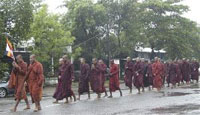Myanmar celebrities support protesting monks
Two Myanmar celebrities handed food and water to protesting monks Monday in the first public show of support by local stars to the country's biggest anti-government protests in two decades.

Diplomats and analysts meanwhile said that that Myanmar's military rulers are showing unexpected restraint in cracking down on the protests because of pressure from the country's key trading partner, China.
Kyaw Thu, an actor famous in Myanmar, joined at least one fellow entertainer, a comedian known as Zargana, in offering up food and water to monks gathered at the Shwedagon Pagoda in Yangon ahead of what was expected to be a seventh day of anti-government protests led by thousands of monks.
Later, as many as 3,000 monks gathered there in preparation for what they had said would be their largest march yet in Myanmar's biggest city since the wave of protests began last month.
"We are Buddhist. All Buddhist have to support this movement," Kyaw Thu said. "We will do whatever we have to do take care of the monks. They are doing a lot on behalf of the people."
On Sunday, about 20,000 people including thousands of monks filled the streets in Yangon, stepping up their confrontation with authorities by chanting support for detained democracy leader Aung San Suu Kyi, who stepped out to greet supporters a day earlier.
The increasingly confrontational tone of the anti-government protesters has raised both expectations of possible political change and fear that the military might forcefully stamp out the demonstrations, as it did in 1988, when it suppressed a democratic uprising and killed thousands of people.
A Southeast Asian diplomat, speaking on condition anonymity citing protocol, said the regime is under pressure from China to avoid a crackdown just as its larger neighbor has pressured it to speed up other democratic changes.
"The Myanmar government is tolerating the protesters and not taking any action against the monks because of pressure from China," the diplomat told The Associated Press. "Beijing is to host the next summer's Olympic Games. Everyone knows that China is the major supporter of the junta so if government takes any action it will affect the image of China."
China, which is counting on Myanmar's vast oil and gas reserves to fuel its booming economy, earlier this year blocked a U.N. Security Council criticizing Myanmar's rights record saying it was not the right forum.
But at the same time, it has employed quiet diplomacy and subtle public pressure on the regime, urging it to move toward inclusive democracy and speed up the process of dialogue and reform.
Josef Silverstein, a political scientist and author of several books on Myanmar, said it would not be in China's interest to have civil unrest in Myanmar, also known as Burma.
"China is very eager to have a peaceful Burma in order to complete roads and railroads, to develop mines and finish assimilating the country under its economic control," Silverstein said. "As long as there is war or potential for war, that doesn't serve China's interest at all."
Larry Jagan, a Bangkok-based analyst who also has written extensively on Myanmar, agreed saying he believes the junta is much more conscious of how its actions play in the international community than in 1988.
"What happened in 1988 _ the bloodshed on the streets _ is not going to be acceptable to the regimes that support the Burmese military regime," he said. "The Chinese, the Indians, the (Southeast Asian countries) are not going to be prepared to see civilians shot mercilessly by soldiers."
The protests in Myanmar began Aug. 19 as a movement against economic hardship, after the government sharply raised fuel prices, increasing the overall cost of living. Arrests and intimidation saw the movement begin to falter until last week, when monks _ who have long served as the country's conscience _ became the protests' vanguard.
The movement seemed to gain momentum Saturday, when more than 500 monks and sympathizers went past barricades to walk to the house where Suu Kyi is under house arrest. She greeted them from her gate in her first public appearance in more than four years.
The meeting symbolically linked the current protests to Nobel laureate's Suu Kyi's struggle for democracy, which has seen her detained for about 12 of the last 18 years.
Subscribe to Pravda.Ru Telegram channel, Facebook, RSS!





